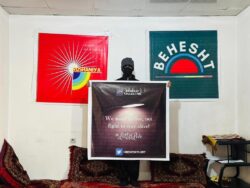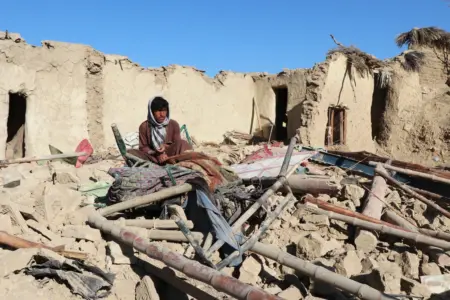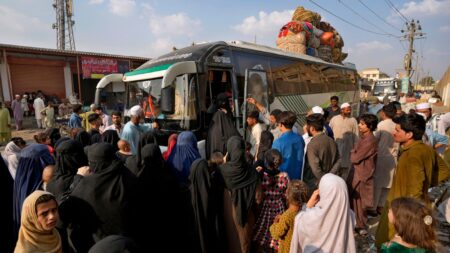People have seemingly forgotten about our situation and the actions of the Taliban
I couldn’t help but feel relief once I’d managed to board a plane after being forced into hiding in Afghanistan.
As we ascended into the clouds, I began to imagine what my future would look like. Would life be different for me? Could I finally be free from persecution? Would I find a country that accepts me for who I am?
But I couldn’t forget the trauma I’d left behind – especially after the Taliban takeover in August 2021.
As a gay man living in Kabul, the strictly conservative Islamic country wasn’t ever really safe for people like me, but we were still able to live with some freedom.
Life was slightly better before the Taliban regained control of the country. I didn’t spend each day constantly fearing what would happen to me if I was captured, and I would go outside more often.
However, same-sex relationships were illegal, so we still had to be careful.
Unfortunately, on a personal level, I couldn’t even tell my family about my sexual orientation as they were deeply religious. If they knew I was gay, they would have disowned me and most likely refused to see me.
But my sexuality wasn’t the only factor in the threat to my life.
In 2011, I became a spy for Afghanistan’s National Directorate of Security (NDS), which conducted operations designed to disrupt and undermine the activities of the Taliban and other terrorist organisations, such as ISIS.
I’d always wanted to protect the sovereignty of my country – helping to thwart enemy plans surrounding planned attacks and travelling to other provinces to establish secure communications between outposts and central NDS departments.
I’d always wanted to protect the sovereignty of my country
I did this for 10 years, all while helping the NDS to develop specialist computer programmes and train other spies in the field.
Then on 12 August 2021, while I was on a covert surveillance operation in the city of Ghazni – around four hours south-west of Kabul – I personally witnessed the Taliban’s terrifying aggression.
They used explosives in what officials there described as the fiercest offensive launched by the group. I felt so scared and that’s when I realised just how much I was at risk of harm if they captured me.
Just days later, the Taliban invaded the capital and forced me into the shadows. The Government’s collapse meant I could no longer serve as a spy, so I experienced serious financial problems.
I soon found myself without an income and had to rely on family members to help me afford basic essentials, such as food and clothes.
Since the Taliban takeover, many LGBTQ+ people in the country have been beaten, tortured and brutally murdered by Taliban soldiers just for being who they are, and I knew that if I didn’t try to escape, I would be next on their list.
This fear was realised in 2021 when a senior Taliban judge confirmed in an interview that gay men will face the death penalty by stoning or having a wall toppled on them if they are found to have gay sex.
On top of that – as a former spy – I knew I would be killed if I was ever captured.
We took a huge risk organising a protest of this size in Kabul (Picture: Behesht Collective)
So when the Taliban arrived in Kabul, I relocated twice. I moved to and from the capital city to the Panjshir Province where, luckily, I owned another house. I was so scared of being discovered that I only left home to go to the store and would wear a mask to hide my face.
The Taliban had information about me and my colleagues and the work we had done for the Government – they had access to the NDS archives containing the details of every agent and had already started to execute spies – so I knew it would not be difficult for them to locate me.
After more than a year of living like this, I knew that I couldn’t maintain this way of life, so in January of last year, I reached out to Roshaniya, which is a non-profit organisation that helps persecuted LGBTQ+ Afghans escape violence.
I had heard about the group on social media and from others during the summer of 2022. Having read about its work to rescue people like me, I reached out hoping to be added to its list of applicants.
By December, I helped to organise a protest with 10 LGBTQ+ friends – who I met through a support group called the Behesht Collective, which is queer and transgender collective based in Afghanistan and the US providing mental health counselling and evacuation support – to raise awareness of our plight.
Our aim was for western nations to recognise us and provide humanitarian visas to help people like me who have been abandoned here escape.
We made placards and printed signs with the slogans #LetUsLive and #WeAreAfghanLGBTQ to help spread our message on social media before arriving at our friend’s house. On the day of the protest, we assembled to take photos and recorded videos of our message to western nations before posting them on Twitter and Facebook.
FOLLOW US ON SOCIAL MEDIA AND SHARE WTX NEWS WITH YOUR FRIENDS AND FAMILY: Facebook – Please like our page Twitter – Twitter updates are available in English and Arabic. Please follow us and we would love to hear from you Instagram – Follow our pages in English and Arabic





